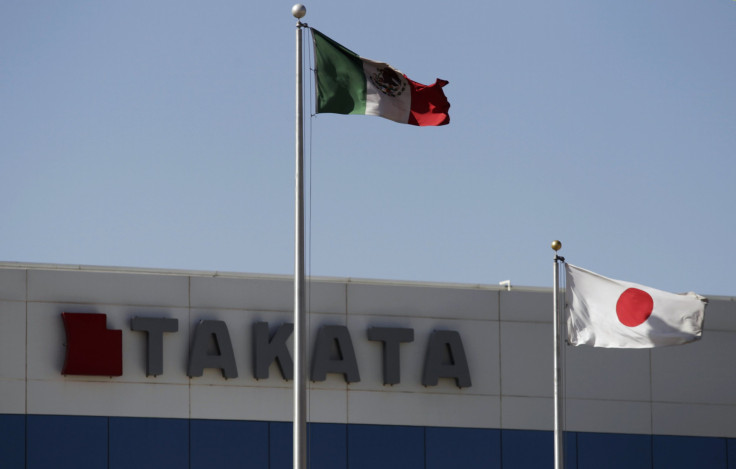Consumer Confusion Mounts As Takata Air Bag Recalls Expand

Airbag recalls from major automakers are beginning to confuse consumers. And critics say the U.S. National Highway Traffic Safety Administration should force automakers to simply recall all cars that have defective air bag inflators.
This week, Ford and Honda are expanding previously announced regional recalls. For the same problem, Chrysler is expanding its recall to include passenger-side air bags of some pickup trucks in high-humidity states. Consumers are left wondering what, for example, happens if someone purchases a car in Florida and then sells it to someone who takes it to Minnesota?
“There's no doubt consumers don’t know whether their cars are affected. I hear from them all the time,” said Clarence Ditlow, head of the Washington, D.C.-based Center for Auto Safety. “Only a nationwide recall will straighten that out. And only a driver side and passenger side nationwide recall will straighten that out.” Ditlow says he's heard from returning enlisted soldiers who have bought cars affected by the recall in one part of the country and are deployed to another region -- they don't know if their cars are included in a recall or not.
* SCROLL TO BOTTOM FOR FULL LIST OF AFFECTED VEHICLES *
Adding to widespread misunderstanding of the problems, Takata, the manufacturer of the defective air bags, insists that recalls should focus on cars in high-humidity regions where moisture can penetrate the inflator and alter the ammonium-nitrate-based chemical formula used to rapidly inflate the bag. Takata holds about 20 percent of the global air bag market, is Honda’s biggest air bag supplier and is the only manufacturer that uses the caustic chemical formula in its inflators, according to Bloomberg.
The defect in 17 million vehicles worldwide has been linked to at least 139 injuries, including more than 30 in the U.S. Five confirmed deaths, four in the U.S. and one in Malaysia, have been linked to the flaw.
Ford said Wednesday it would expand a previously announced region-based recall to include all affected 2004-2005 model year Ford Ranger pickup trucks and 2005-2006 Ford GT sports cars nationwide. The Dearborn, Michigan, automaker – which says 98,000 of its vehicles contain the defect – initially announced a regional recall in June of some Rangers, GTs and 2005-2008 Mustangs sold or registered in Florida, Puerto Rico, Hawaii and the U.S. Virgin Islands.
Honda made a similar announcement Wednesday to expand nationwide a previously reported regional recall. About 10 million vehicles, mostly Honda vehicles, have been recalled in the U.S. since 2008, including about 7.8 million so far this year.
Chrysler in a separate announcement on Wednesday said it would voluntarily replace passenger-side Takata air bag inflators in about 149,000 model-year 2003 Ram pickups, including the larger 2500 and 3500 heavy-duty trucks that were sold or registered in Alabama, Florida, Georgia, Hawaii, Louisiana, Mississippi, Texas and U.S. territories.
Chrysler says it is continuing to study the air bag inflator issue “with great urgency,” but the NHTSA says the automaker needs to include more vehicles in its regional recall.
“Chrysler’s latest recall is insufficient, doesn’t meet our demands, and fails to include all inflators covered by Takata's defect information report,” the agency said in a statement to Automotive News.
The NHTSA also has taken issue with Takata’s resistance to complying with its demand to expand its recall to cover all affected cars in the country and is considering imposing a fine against the Japanese parts manufacturer. In Senate testimony last week, Hiroshi Shimizu, Takata’s senior vice president of global quality assurance, insisted that the hot and humid regions “must be the priority for the replacement of the suspect inflators.”
For further information, vehicle owners can go to the manufacturers; consumer websites or NHTSA’s Vehicle-Identification-Number-lookup tool. The NHTSA currently (as of Dec. 2, 2014) lists the following vehicles that contain the faulty Takata air bags.
Honda/Acura: 5,051,364 potentially affected vehicles
2001 – 2007 Honda Accord
2001 – 2005 Honda Civic
2002 – 2006 Honda CR-V
2003 – 2011 Honda Element
2002 – 2004 Honda Odyssey
2003 – 2007 Honda Pilot
2006 – Honda Ridgeline
2003 – 2006 Acura MDX
2002 – 2003 Acura TL/CL
2005 – Acura RL
Toyota/Lexus: 877,000 potentially affected vehicles
2002 – 2005 Lexus SC430
2002 – 2005 Toyota Corolla
2003 – 2005 Toyota Matrix
2002 – 2005 Toyota Sequoia
2003 – 2005 Toyota Tundra
Nissan/Infiniti: 717,364 potentially affected vehicles
2001 – 2003 Nissan Maxima
2001 – 2004 Nissan Pathfinder
2002 – 2006 Nissan Sentra
2001 – 2004 Infiniti I30/I35
2002 – 2003 Infiniti QX4
2003 – 2005 Infiniti FX35/FX45
2006 Infiniti M35/M45
BMW: 627,615 potentially affected vehicles
2000 – 2005 3 Series Sedan
2000 – 2006 3 Series Coupe
2000 – 2005 3 Series Sports Wagon
2000 – 2006 3 Series Convertible
2001 – 2006 M3 Coupe
2001 – 2006 M3 Convertible
Chrysler/Dodge: 371,309 potentially affected vehicles
2003 – 2008 Dodge Ram 1500
2005 – 2008 Dodge Ram 2500
2006 – 2008 Dodge Ram 3500
2006 – 2008 Dodge Ram 4500
2008 – Dodge Ram 5500
2005 – 2008 Dodge Durango
2005 – 2008 Dodge Dakota
2005 – 2008 Chrysler 300
2007 – 2008 Chrysler Aspen
Mazda: 64,872 potentially affected vehicles
2003 – 2007 Mazda6
2006 – 2007 MazdaSpeed6
2004 – 2008 Mazda RX-8
2004 – 2005 MPV
2004 – B-Series Truck
Ford: 98,000 potentially affected vehicles (est.)
2004 – 2005 Ranger
2005 – 2006 GT
2005 – 2008 Mustang
Subaru: 17,516 potentially affected vehicles
2003 – 2005 Baja
2003 – 2005 Legacy
2003 – 2005 Outback
2004 – 2005 Impreza
2004 – 2005 Impreza WRX/STI
Mitsubishi: 11,985 potentially affected vehicles
2004 – 2005 Lancer
2006 – 2007 Raider
General Motors: unknown number of potentially affected vehicles
2003 – 2005 Pontiac Vibe
2005 – Saab 9-2X
© Copyright IBTimes 2024. All rights reserved.






















